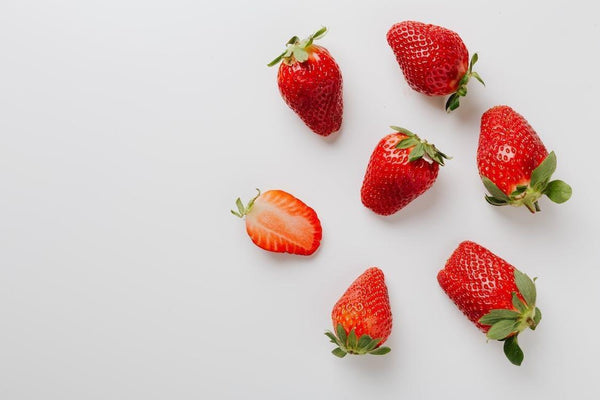
Jump to:
Strawberries may possibly be one of the most popular and well known fruits in the world. In Japan, strawberries undoubtedly hold this sentiment and are grown under strict conditions to ensure their delicious flavor and beautiful presentation. Not to mention, strawberries are one of the most beloved fruits in Japan. In fact, they are so popular that there is a dedicated Strawberry Day in Japan on January 15th every year!
What makes Japanese strawberries so unique compared to strawberries of other countries? We’ll take a closer look at Japanese strawberries in this article so that you can understand why they're such a special fruit. The next time you travel to Japan, we hope you'll try out some authentic Japanese strawberries for yourself.
Characteristics of Japanese Strawberries

Japanese strawberries are notorious for having the following characteristics:
- They are usually deep red in color.
- They do not have a hollow center.
- Most are quite sweet in flavor and have only a mild acidity.
- They are expensive!
An average pack of Japanese strawberries costs around 500 yen ($3.80). Remember, Japanese packs of strawberries are much smaller than the carton of strawberries you might find in your local supermarket. Not to mention, there are gift giving varieties of strawberries in Japan that can cost more than $100 USD!
How are Japanese strawberries cultivated?

Strawberry season runs from early December to late May in Japan. It may seem a bit strange that strawberries are grown and can be purchased during the winter months, especially since strawberry season takes place in the summer in many other countries. The reason strawberries can be grown in wintertime in Japan is because the majority of strawberry cultivation takes place in greenhouses. In order to ensure all of the strawberries become delicious in taste as well as uniform in shape and size, a stable environment and carefully controlled temperatures are key variables.
Varieties
There are more than 300 different strawberry varieties in Japan (312 to be precise, according to the Ministry of Agriculture, Forestry and Fisheries of Japan), but here are some of the most well known (and arguably tastiest) ones.
Amaou あまおう

Quite possibly the most famous Japanese strawberry variety. Often referred to as the king of strawberries and originating in Fukuoka, which is located in Kyushu. Amaou stands for:
- Akai (赤い) red
- Marui (丸い) round
- Amai (甘い) sweet
- Ookii (大きい) big
- Umai (うまい) delicious
Just by understanding the meaning of the amaou name, it is easy to see how these strawberries have gained quite the reputation in Japan.
When looking at an amaou strawberry, it is apparent just how luxurious it is just on its appearance alone. Amaou strawberries have a deep, red color, which makes them stand out easily in supermarkets. They are also quite bigger than average strawberries, about 2 or 3 times bigger to be exact.
Flavorwise, amaou strawberries have quite a unique and distinct flavor. Usually strawberries are quite sour and have a strong acidic taste, but amaou strawberries are much sweeter and are only slightly sour.
There’s no doubt that these strawberries aren’t delicious. However, taste and beauty don’t come cheap. A pack of 9 amaou strawberries in the supermarket will run you around 700-900 yen on average. That’s almost $10 for a pack of strawberries! There are even more expensive versions of amaou strawberries sold in high end department stores that can cost more than $50 or even $100 USD.
Beni hoppe 紅ほっぺ

The Beni Hoppe strawberry variety may not be as prestigious or expensive as the Amaou variety, but they are still delicious nonetheless. This variety of strawberry is grown in Shizuoka prefecture and is commonly found in Japanese supermarkets. Beni Hoppe strawberries have a bit more of a modest price point of 400 to 600 yen per pack.
Roughly translated as “red cheek” in Japanese, Beni Hoppe strawberries are so yummy that they will make your cheeks drop out of happiness when you eat them. Beni Hoppe strawberries can be described as having a well balanced sweet and sour flavor. The outside as well as the flesh both have a bright and vibrant red color.
Saga Honoka さがほのか

Another strawberry variety grown in the Kyushu area of Japan, specifically in Saga prefecture, the Saga Honoka strawberry can be described as having a sweet taste with little acidity. These strawberries have a bright red body, but interestingly have white flesh. They also have a pronounced triangle shape.
Tochi Otome とちおとめ

The Tochi Otome strawberry originates in Tochigi prefecture and is one of the most popular Japanese strawberry varieties found in supermarkets. Not only are Tochi Otome strawberries beautiful, but they are of course also delicious. They have a balanced sweet and sour flavor, deep, red color, and nicely pointed shape. In fact, Tochi Otome strawberries are so aesthetically pleasing that they are the go-to strawberry choice for decorating desserts in Japan.
Hatsukoi no Kaori 初恋の香り

Finally, here’s a bit of a wild-card strawberry, a white strawberry! Not only do these strawberries have an unusual white appearance, their name Hatsukoi no Kaori translates to the scent of first love.
It may seem quite strange to eat a white strawberry since their appearance makes them look unripe. However, that is far from the truth! These strawberries have a light and mellow sweetness that cannot be found in any other variety of strawberry. They also have a slightly higher sugar content than regular strawberries, which is why they don’t even have the slightest tang. Another unique feature of these strawberries is that they have red seeds, giving them the exact opposite color scheme of regular strawberries.
The Hatsukoi no Kaori strawberry was not intended to be a strawberry for normal or everyday consumption. These special strawberries are usually given as gifts for birthdays, weddings, or housewarming celebrations. In fact, just one of these strawberries can cost more than 1000 yen, or upwards of $8.
Where to buy Japanese strawberries

In Japan, strawberries can be purchased in normal supermarkets from early December to late May. Depending on the variety, the average price may cost anywhere from 400 to 700 yen. Packages of strawberries may be much smaller than packages of strawberries in your own country though, and you may end up only getting around 9 or 12 strawberries per pack.
If you have the opportunity, visiting a strawberry farm in Japan is also a great chance to experience tasting delicious strawberries right off the stem. There are strawberry farms located in every prefecture in Japan, and many of them are quite tourist friendly.
For higher end strawberries intended for gift giving or simply treating yourself, you can purchase strawberries from department stores and even some specialized strawberry or agriculture cafes in Japan. No matter where you purchase your strawberries from, they will be undoubtedly delicious.
Japanese Sweets Featuring Strawberries
If you don't have the chance to try fresh strawberries on their own when you come to Japan, consider trying one of these strawberry Japanese desserts instead.
Strawberry shortcake

An iconic Japanese cake that’s made up of three components - fluffy sponge cake, whipped cream, and strawberries. It’s a simple yet tasty cake that’s often enjoyed during Christmas and birthday celebrations.
Daifuku

Daifuku are a type of Japanese wagashi consisting of chewy mochi, red or white bean paste, and fruit. The most common fruit choice for daifuku, especially around wintertime, are strawberries.
Ichigo sando

Ichigo sando is a strawberry sandwich that is made up of fluffy white bread, slightly sweetened whipped cream, and strawberries. It may sound strange, but these sandwiches are so popular in Japan and have even started to become popular overseas in recent years.
Ichigo Ame

Ichigo Ame, which translates to candied strawberries, is a popular street food that actually comes from China. Originally called Tanghulu, strawberries are coated in a sugar syrup which becomes hard when it cools. Ichigo ame has a unique texture and nice contrast between the sweet candy coating a slightly acidic taste from the strawberries. This is a snack commonly eaten at festivals and amusement parks.
Have you ever tried real Japanese strawberries? How did they taste? If you haven’t been able to taste a Japanese strawberry yet, which kind do you want to try? Let us know in the comments below!


0 comments